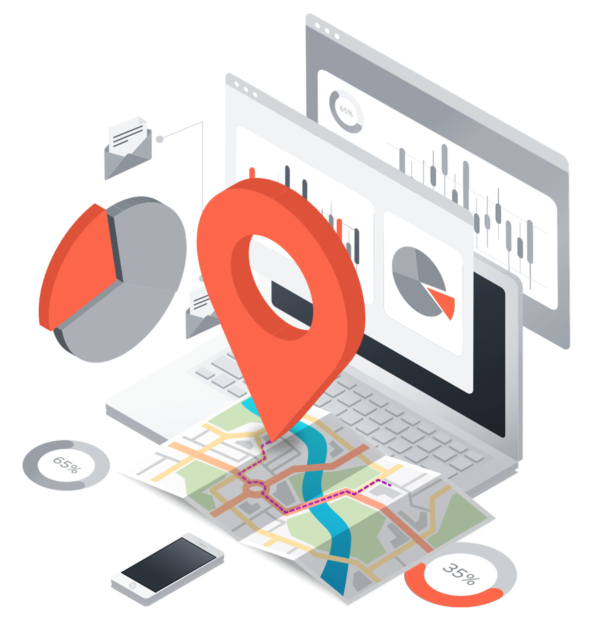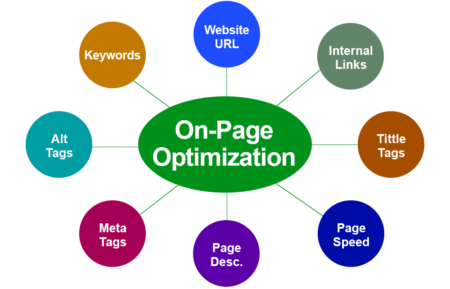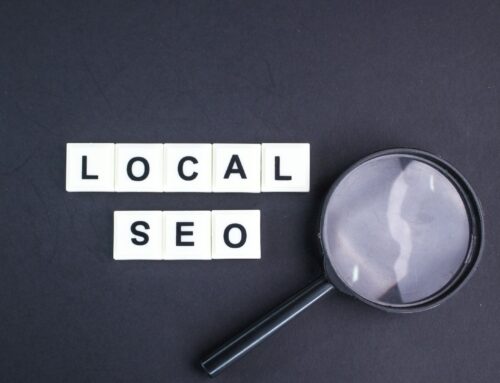Table of Contents
If you’re running an ecommerce business, you know the importance of getting your products in front of the right audience. Local SEO can help you do just that by improving your search engine rankings for location-specific searches. Ecommerce local SEO optimizes your online store for local search queries, such as “running shoes near me” or “best coffee shop in Chicago.”
Local SEO involves various strategies, including optimizing your website content, building local citations, and claiming your Google My Business listing. By implementing these tactics, you can improve your visibility in local search results and attract more customers to your online store. Search engines like Google and Bing prioritize local results for location-specific searches, making it essential for ecommerce businesses to invest in local SEO.

Understanding E-Commerce Local SEO
If you run an e-commerce business, you need to understand the importance of local SEO. Local SEO is the process of optimizing your website for local search queries. It can help you improve your visibility in search engine results pages (SERPs) and attract more customers to your online store.
The Importance of Local SEO for E-commerce
Local SEO is essential for e-commerce businesses because it can help attract more local customers. By optimizing your website for local search queries, you can improve your visibility in local search results, which can help you attract more customers who are searching for products or services in your area.
Local SEO can also help you build trust with your customers. When your website appears at the top of local search results, it can help you establish yourself as a reputable and trustworthy business in your local area. This can help you attract more customers and build a loyal customer base.
Critical Components of Local SEO
There are several critical components of local SEO that you need to consider when optimizing your e-commerce website. These include:
- Keyword research: Keyword research is essential to any local SEO strategy. By identifying the keywords and phrases your target audience is searching for, you can optimize your website and content to target these keywords and improve your visibility in local search results.
- On-page optimization: Optimizes your website’s content, meta tags, and other elements to improve your visibility in search results. This includes optimizing your website’s title tags, meta descriptions, header tags, and content for local search queries.
- Local listings: Local listings are online directories that list businesses in a particular area. By claiming and optimizing your local listings, you can improve your visibility in local search results and attract more customers to your e-commerce store.
- Online reviews: Online reviews are an essential factor in local search rankings. By encouraging your customers to leave positive reviews on your website and other online platforms, you can improve your visibility in local search results and attract more customers to your e-commerce store.

local SEO is critical to any e-commerce business’s marketing strategy. By optimizing your website for local search queries, you can improve your visibility in search results, attract more customers to your store, and build a loyal customer base over time.
Optimizing Your Online Store for Local Search
To improve your online store’s visibility in local search results, you need to optimize it for local SEO. Here are some strategies you can use:
Keyword Research for Local Audiences
You need to use local keywords in your website content to attract local customers. Research your target audience’s keywords to find products or services like yours. Use tools like Google Keyword Planner, Ahrefs, or SEMrush to identify relevant keywords.
Once you have a list of keywords, use them in your website content, including your product descriptions, titles, meta tags, and URLs. This will help search engines understand that your website is relevant to local search queries.
Creating Location-Specific Content
Creating location-specific content is another effective way to optimize your online store for local search. This can include blog posts, landing pages, or product descriptions tailored to a specific location. For example, if you sell hiking gear, you could create a blog post about the best hiking trails in your area.
Creating location-specific content can attract local customers interested in your products or services. This can help improve your website’s visibility in local search results.
Optimizing On-Page Elements
Optimizing your website’s on-page elements is also essential for local SEO. This includes your title tags, meta descriptions, and URLs. Ensure that your title tags and meta descriptions include your target keywords and are written compellingly to local customers.
In addition, make sure that your URLs are short and descriptive and include your target keywords. This will help search engines understand the content of your pages and improve your website’s visibility in local search results.
Optimizing your online store for local search can help you attract more local customers and improve your website’s visibility in local search results. Using local keywords, creating location-specific content, and optimizing your on-page elements can enhance your website’s relevance to local search queries and drive more traffic to your online store.

Leveraging Google My Business for Local E-commerce
If you’re running an e-commerce business, optimizing your Google My Business (GMB) profile can significantly enhance your online visibility and drive more traffic to your website. This section will explore how to leverage Google My Business for local e-commerce.
Setting Up Your Google Business Profile
Setting up your Google Business Profile is the first step towards leveraging Google My Business for local e-commerce. Ensure you fill out all the relevant information, including your business name, address, phone number, website, and business hours.
It’s also essential to choose the right category for your business. This will help Google understand and show your business to the right customers. You can select up to 10 categories that best describe your business.
In addition to the basic information, you can also add photos, videos, and virtual tours to your Google Business Profile. This will help customers better understand your business and increase their trust in your brand.
Managing Reviews and Ratings
Online reviews are a critical component of local SEO; managing them is essential for e-commerce businesses. Positive reviews can help improve your online reputation and drive more traffic to your website. Conversely, negative reviews can hurt your business and drive potential customers away.
Monitor your reviews regularly and respond to them promptly. Thank customers for positive reviews and address any concerns raised in negative reviews. This will show customers you care about their feedback and are committed to providing excellent customer service.
It’s also important to encourage customers to leave reviews. You can do this by adding a link to your Google Business Profile on your website or including a call-to-action in your email marketing campaigns.
In conclusion, leveraging Google My Business for local e-commerce can help improve your online visibility, drive more traffic to your website, and increase customer engagement with your brand. By setting up your Google Business Profile and managing your reviews and ratings, you can take your e-commerce business to the next level and achieve tremendous success.

Building Local Relevance and Prominence
It would be best to focus on building local relevance and prominence to improve your local SEO. Here are two key aspects to consider:
Citations and Local Directories
Citations and local directories are essential to building local relevance and promoting your business. Citations mention your business name, address, and phone number (NAP) on other websites. Local directories are websites that list businesses in a specific geographic area. You can improve your local SEO by ensuring your business information is consistent across all directories and citations.
You can use tools like Moz Local, BrightLocal, or Yext to manage your business listings across different directories to get started. You can also manually search for local directories and submit your business information to them. Include accurate and up-to-date information, and choose relevant categories and keywords to describe your business.
Gaining Quality Backlinks
Backlinks are links from other websites to your website. They are an essential factor in determining your website’s authority and relevance. To improve your local SEO, you must gain quality backlinks from other local businesses, organizations, or authoritative websites.
One way to gain backlinks is to create high-quality content that other websites want to link to. You can also ask local businesses or organizations to link to your website. Another option is to participate in local events or sponsor local charities and organizations, which can help you gain exposure and build relationships with other businesses.
Building local relevance and prominence is essential to improving your local SEO. By focusing on citations, regional directories, and quality backlinks, you can increase your visibility and attract more local customers to your business.

Measuring and Improving Local SEO Performance
To ensure the success of your e-commerce business, it is essential to measure and improve your local SEO performance. This can be done by tracking your local search rankings and analyzing and refining your SEO strategies. Here are some tips to help you get started.
Tracking Local Search Rankings
One of the most important aspects of measuring local SEO performance is tracking your local search rankings. You can use tools like Google Analytics and Google Search Console to monitor your search engine results pages (SERPs) and see how your website is performing in local searches. You can also use third-party tools like Ahrefs and Moz to track your rankings and see how you compare to your competitors.
It would help you focus on the right keywords to track your local search rankings effectively. Use tools like Google Keyword Planner to identify your business’s most relevant and high-traffic keywords. Once you have identified your target keywords, track your rankings for these keywords regularly and monitor your progress over time.
Analyzing and Refining SEO Strategies

You must analyze your data and refine your SEO strategies to improve your local SEO performance. Use analytics tools to track your website traffic, conversions, and click-through rate (CTR). Identify which pages on your website are performing well and which need improvement. Use this data to optimize your website content, meta tags, and other on-page elements.
It would be best if you also focused on building high-quality backlinks to your website. You can do this by contacting other websites in your industry and asking them to link back to your site. You can also create valuable content other websites want to link to, such as blog posts, infographics, and videos.
In conclusion, measuring and improving your local SEO performance is essential for the success of your e-commerce business. You can increase your website traffic, conversions, and revenue by tracking your local search rankings and analyzing and refining your SEO strategies.







